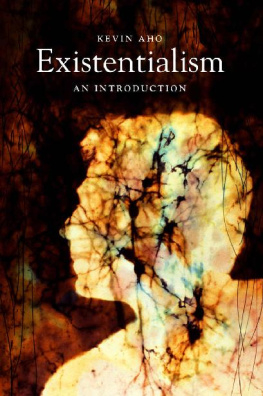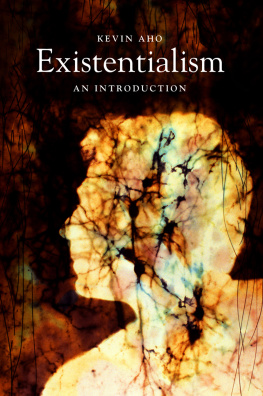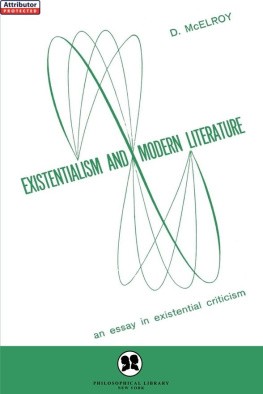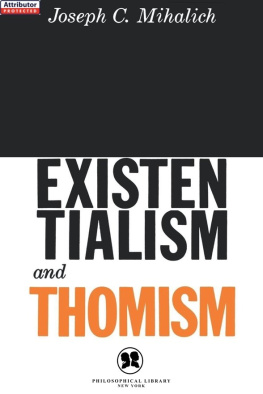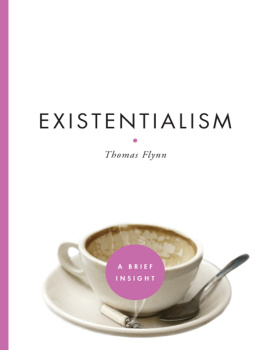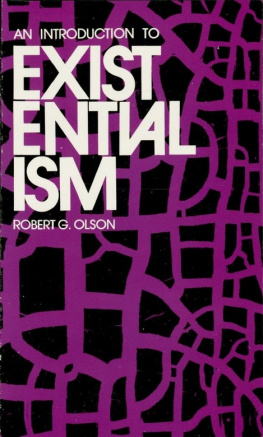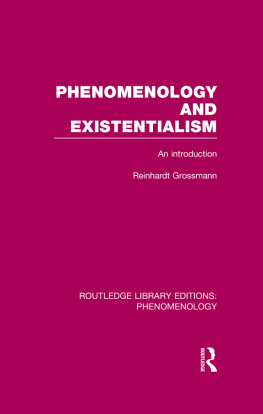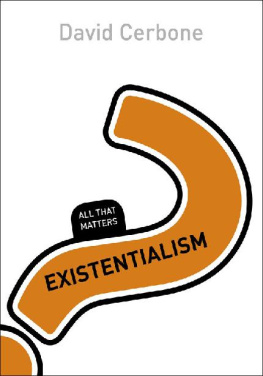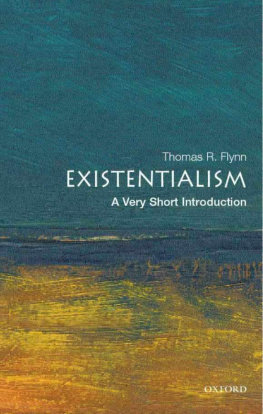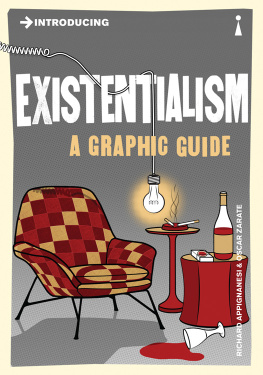Kevin Aho - Existentialism
Here you can read online Kevin Aho - Existentialism full text of the book (entire story) in english for free. Download pdf and epub, get meaning, cover and reviews about this ebook. year: 2014, publisher: Wiley, genre: Religion. Description of the work, (preface) as well as reviews are available. Best literature library LitArk.com created for fans of good reading and offers a wide selection of genres:
Romance novel
Science fiction
Adventure
Detective
Science
History
Home and family
Prose
Art
Politics
Computer
Non-fiction
Religion
Business
Children
Humor
Choose a favorite category and find really read worthwhile books. Enjoy immersion in the world of imagination, feel the emotions of the characters or learn something new for yourself, make an fascinating discovery.
Existentialism: summary, description and annotation
We offer to read an annotation, description, summary or preface (depends on what the author of the book "Existentialism" wrote himself). If you haven't found the necessary information about the book — write in the comments, we will try to find it.
Existentialism — read online for free the complete book (whole text) full work
Below is the text of the book, divided by pages. System saving the place of the last page read, allows you to conveniently read the book "Existentialism" online for free, without having to search again every time where you left off. Put a bookmark, and you can go to the page where you finished reading at any time.
Font size:
Interval:
Bookmark:
Table of Contents

Copyright Kevin Aho 2014
The right of Kevin Aho to be identified as Author of this Work has been asserted in accordance with the UK Copyright, Designs and Patents Act 1988.
First published in 2014 by Polity Press
Polity Press
65 Bridge Street
Cambridge CB2 1UR, UK
Polity Press
350 Main Street
Malden, MA 02148, USA
All rights reserved. Except for the quotation of short passages for the purpose of criticism and review, no part of this publication may be reproduced, stored in a retrieval system, or transmitted, in any form or by any means, electronic, mechanical, photocopying, recording or otherwise, without the prior permission of the publisher.
ISBN-13: 978-0-7456-5141-5
ISBN-13: 978-0-7456-5142-2(pb)
ISBN-13: 978-0-7456-8285-3(epub)
ISBN-13: 978-0-7456-8284-6(mobi)
A catalogue record for this book is available from the British Library.
The publisher has used its best endeavours to ensure that the URLs for external websites referred to in this book are correct and active at the time of going to press. However, the publisher has no responsibility for the websites and can make no guarantee that a site will remain live or that the content is or will remain appropriate.
Every effort has been made to trace all copyright holders, but if any have been inadvertently overlooked the publisher will be pleased to include any necessary credits in any subsequent reprint or edition.
For further information on Polity, visit our website: www.politybooks.com
Acknowledgments
This book could not have been written without the teachers who first introduced me to existentialism. The initial exposure came from my parents, Jim and Margaret Aho, whose bookshelves were filled with the works of Camus, Kierkegaard, Kafka, Sartre, Dostoevsky, Tolstoy, Rilke, and Nietzsche (though strangely, nothing from Heidegger). For them, the only thing that mattered in life was being true to oneself, and without their encouragement and dog-eared copy of The Brothers Karamazov which I read during winter break of my freshman year in college I may never have changed my major to philosophy and fallen so hard for existentialism. They have followed and supported my path from the ski slopes of Utah and Wyoming to the urban canyons of Manhattan to the sub-tropical swamps and beaches of south Florida. They have also read, commented on, and edited early drafts of this book, and their sharp and incisive feedback throughout the process has been invaluable. My brothers, Ken and Kyle, have also been my teachers, showing me what genuine acts of self-creation are through their music, art, and bold adventures in the mountains.
There were also a number of influential professors in college and graduate school who exposed me to different aspects of existentialist thought, including Carl Levenson and Paul Tate at Idaho State University; Agnes Heller and Bernard Flynn at the New School for Social Research; Bernard Harrison at the University of Utah; and Stephen Turner, Ofelia Schutte, and Joanne Waugh at the University of South Florida. But of all the teachers I've had over the years, the most important and enduring has been Charles Guignon. Indeed, this book was originally conceived as a co-authored project, and many of the ideas were developed over lengthy conversations with Charles over the past decade. His intellectual guidance and friendship have been a steady presence, and this book could not have been completed without him. Of course, with that said, any scholarly and interpretive errors in the book are mine alone.
I also have to acknowledge the consistent institutional support at Florida Gulf Coast University and my warm and supportive colleagues, especially Margaret Hambrick, Glenn Whitehouse, Jim Wohlpart, Sean Kelly, Mohamad Al-Hakim, and Donna Henry. They helped to create a pluralistic and open intellectual space where I could freely pursue my own research projects and integrate them into my teaching in existentialist-themed courses like The Philosophy of Death and Dying, The Tragedy of Technology, Existential Psychotherapy, and Phenomenology of the Body. I have also been blessed with wonderful students who have taken my courses over the years, including Ashley Levy, Ellie Levy, Jonathan Wurtz, Paul Smith, Jon Morheim, Adil Mughal, Jameson Yingling, and Natalie Worebel. I am especially thankful to Adil Mughal and Diana Ruiz for helping me to compose the selected bibliography for this volume. And I am indebted to Ariel Ruiz i Altaba for his generosity in once again allowing me to use his artwork for the cover of a book. This particular image is appropriately called Choices from a powerful collection of his entitled Traces.
The editorial staff at Polity Press has been nothing less than superb throughout the process. Sarah Lambert, Pascal Porcheron, India Darsley, and Emma Hutchinson were consummate professionals; they were consistently supportive of the project and always timely and thoughtful in their responses to any questions I had. Emma, in particular, was especially helpful as the project neared completion. Eric Schramm's detailed and rigorous copyediting saved me from a number of stylistic and technical embarrassments. And three anonymous referees for Polity offered extensive and insightful comments for revisions that sharpened the manuscript.
Finally, there is an inexpressible debt of gratitude to Elena Ruz. In many ways, our relationship reflects the enduring cross-cultural power of existentialist thought. A Latina born and raised in Mexico City and a small-town mountain boy from Idaho came together at the University of South Florida in Tampa, and our connection flourished and deepened over late-night discussions of Nietzsche, Camus, and Kierkegaard. She, more than anyone I know, is an incarnation of what matters in existentialism, living with sense of committed passion and intensity, accepting the inescapable frailty of the human situation, and attentive to the suffering of others. This book is dedicated to her.
Preface
One of the difficulties in writing a book about existentialism is the word itself. It is an ism that gives the misleading impression of a coherent and unified philosophical school. The word was officially coined by the French philosopher Gabriel Marcel in 1943 and quickly adopted by his compatriots Jean-Paul Sartre and Simone de Beauvoir. But many of the major twentieth-century figures, such as Martin Heidegger, Maurice Merleau-Ponty, and Albert Camus, rejected the label, and nineteenth-century pioneers like Sren Kierkegaard and Friedrich Nietzsche had never heard of it. Indeed, the representative figures are anything but unified in their views. There are secular existentialists like Sartre, Nietzsche, and Camus whose philosophies are informed by the death of God, but there are also prominent theistic existentialists like Marcel, Paul Tillich, and Martin Buber. There are existentialists who claim that we are radically free and morally responsible for our actions, and others, like Nietzsche, who contend that the idea of free will is a fiction. There are some, like Kierkegaard, Beauvoir, and Sartre who maintain that existentialism is a form of subjectivism, while others, such as Heidegger and Merleau-Ponty, reject this equivocation and posit the centrality of intersubjectivity or being-in-the-world. And there are figures who argue that our relations with others are invariably mired in alienation, self-deception, and conflict, but there are also those who develop notions of mutual dependency, selfless love, and genuine communion with others.
Yet, given these conflicting views, there are clear indications of a new philosophical orientation emerging in modern Europe, centering specifically on the question of what it means
Font size:
Interval:
Bookmark:
Similar books «Existentialism»
Look at similar books to Existentialism. We have selected literature similar in name and meaning in the hope of providing readers with more options to find new, interesting, not yet read works.
Discussion, reviews of the book Existentialism and just readers' own opinions. Leave your comments, write what you think about the work, its meaning or the main characters. Specify what exactly you liked and what you didn't like, and why you think so.

